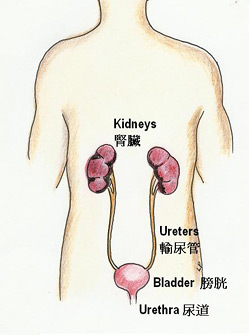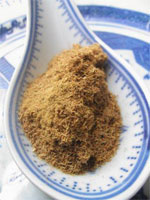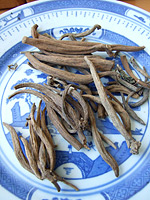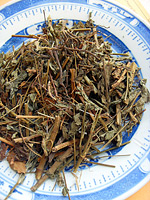|
Blood in the urine may appear as pink, red or cola-colored, which often indicate bleeding in the urinary tract, somewhere from the kidneys, ureters, bladder or urethra. Some people may also pass blood clots in their urine. For a mild bleeding that is invisible to the naked eye, blood can only be detected microscopically.
 |
The urinary tract |
Blood in the urine is not always serious, it can be seen after strenuous exercise, other factors like medications and foods can turn the urine in red too. However, you should report to your doctor if you notice visible blood in your urine, or a change of urine color that is not related to foods, medications, supplements or dyes. A full evaluation by health professionals is necessary, so as to determine the source of bleeding and to rule out any serious disorder, such as:
 |
Urinary tract infections |
 |
Kidney diseases |
 |
Kidney and bladder stones |
 |
Cancers |
 |
Prostate problems |
 |
Blood or bleeding disorders |
Blood in the urine can only be relieved by treating the underlying condition. In case if clinical examination cannot determine the source of bleeding or the cause remains unknown, you may try Chinese medicine methods for relief.
In traditional Chinese medicine (TCM) understanding, urine comes from the body fluid. It is the “turbid” water or left over body fluids that collected by the kidneys, and then stored and excreted by the bladder. Bloody urine often indicates that the bladder meridian is over-heated, that can be a result of different internal disharmonies. Mental stress, improper diet or chronic health conditions bring about fire or heat pathogens by different organs, the pathogens irritate the urinary tract through the bladder meridian, and cause bleeding. Moreover, spleen or kidney weakness that fails to keep the blood flowing within the blood vessels can also result in urinary bleeding. TCM will treat blood in the urine according to the affected organs, the pathogenic factors and the accompanying symptoms.
 |
|
 |
|
 |
| cattail pollen |
|
thistle herbs |
|
hairyvein agrimonia herb |
1. Herbal prescriptions for blood in the urine
When examining urinary problems, physicians note the frequency, quantity, nature, color, smell of urine, and also the presence or absence of accompanying physical feelings. Physicians discern a subtle pattern according to individual symptoms, which then use as a guide to determine therapeutic strategies and to design or select proper formulae. The followings are common disharmony patterns that involve blood in the urine.
Damp-heat in liver meridian
Bloody urine, and a burning sensation during urination, other symptoms may include headache, dizziness, mouth dryness or a bitter taste in the mouth, and discomfort in the rib sides. A red tongue covered by yellow and greasy coating, the pulse is taut and rapid. The situation is usually aggravated by anger or emotional stress. The remedy should aim to clear liver heat and promote urination.
Sample prescription: modified Gentian Liver-Purging Decoction
Yin deficiency causing virtual fire
Passing scanty and red urine, a hot sensation during urination, other symptoms may include dizziness, ear ringing, irritability, mouth dryness, lumbar soreness, knee weakness, seminal emission in men, red cheeks and even hot flushes in the afternoon. The tongue is red and covered with little coating, the pulse is thready and rapid. The remedy should aim to nourish kidneys, clear heat and promote urination.
Sample prescription: Rehmannia Pill Plus Anemarrhena and Corktree Bark, and also field thistle herb (charred) and plantain seed
Hyperactive fire in heart
Passing scanty and bright red urine, hot and painful sensations during urination, other symptoms include irritability, insomnia, a flushed face, mouth sores, thirst and constipation. The tongue has a red tip and is covered by yellow coating, and the pulse is rapid. The remedy should aim to clear heart fire, cool blood and promote urination.
Sample prescription: Guide Out the Red Powder plus Field Thirtle Decoction and poria
Kidney yang deficiency
Individuals pass pink urine persistently and with a large amount, there may be dribbling after urination. Other symptoms may include dizziness, ear ringing, fatigue, lumbar soreness, chills, and sexual dysfunctions. The tongue is pale, and the pulse is deep and weak. The remedy should aim to warm kidney and reinforce its grasping ability and stop bleeding.
Sample prescription: deer horn gelatin, processed rhemannia rhizome, carbonized hair and couch grass rhizome
Spleen deficiency
Persistent or recurrent episodes of bloody urine, other symptoms may include a low appetite, fatigue, general weakness, paleness, breath shortness, a pale tongue and a weak pulse. There may also be gum bleeding or bleeding under the skin. The remedy should aim to invigorate spleen and reinforce its ability to astringent blood.
Sample prescription: Restore the Spleen Decoction plus processed rhemannia rhizome, donkey-hide gelatin and hairyvein agrimonia herb
In TCM experience, blood in the urine is mostly due to damp-heat accumulated in the bladder, and dysfunctions of the heart, liver or kidneys also play important roles in its development. Although the remedies are designed to stop bleeding, herbs that dispel stasis, smooth blood flow and nourish blood should be selected appropriately.
2. Acupuncture therapy for blood in the urine
Acupuncture therapy activates blood and qi (vital energy), and enhances the self-regulating power of the body. According to TCM theory, internal changes associated with blood in the urine are mostly qi deficiency or excessive heat. Acupuncture helps the body to rectify from these pathological changes and thus relieve the associated symptoms. Appropriate point selection and stimulating techniques are essential, major acupoints are mainly selected along the meridians of involved organs, for example:
Disharmony patterns |
Suggested body points |
Stimulation methods |
Hyperactive fire in heart |
lao gong (Pc8), xing jian (Lr2), zhong ji (Cv3), yin ling quan (Sp9) & xiao chang shu (Bl27) |
reducing techniques, which aim to eliminate pathogens and suppress the hyper-functioning of the heart |
Kidney and spleen dysfunctions |
yin bai (Sp1), guan yuan shu (Bl26), zu san li (St36), pi shu (Bl20), ge shu (Bl17) shen shu (Bl23) & san yin jiao (Sp6) |
even techniques, which aim to invigorate the spleen and kidneys, replenish qi and reinforce its ability to astringent blood |
3. Home care advice for blood in the urine
Internal heat is an important factor for those who pass bloody urine, the pathogens damage the blood vessels and result in reckless movement of hot blood. Individuals are advised to limit the amount of roasted, hot and spicy foods, avoid alcohol and smoking. They should also eat more ingredients that have a cooling effect and promote urination, such as green vegetables, mung bean, bottle gourd, water melon, wax gourd, red rice bean, pears, lotus root, reed rhizome, water chestnut, carps and cuttlefish. The daily meals are better prepared as cooked foods, and can supply adequate amount of water to the body.
Simple recipes that suitable for blood in the urine are:
 |
Herbal tea: fresh couch grass rhizome (60g) and sugar cane (300g). Boil with 3000ml water for 1 hour. Keep the solution warm and drink regularly during the day. This is suitable for damp-heat type. |
 |
Herbal soup: yerbadetajo herb (30g) and lean pork meat (200g). Boil as soup. This is suitable for yin deficiency type. |
 |
Herbal congee: pilose asiabell root (10g) Chinese yam (10g), donkey-hide gelatin (6g) and glutinous rice (100g). First boil the pilose asiabell root with 400ml water for 15 minutes to make a solution. Use a pot to boil 2000ml water, add the herbal solution, Chinese yam and rice; simmer under low heat until the liquid thickens. Crush the donkey-hide gelatin, add in the congee and stir evenly, add sugar to taste, turn off the heat and ready to serve. This is suitable for spleen deficiency type. |
 |
Herbal congee: cherokee rose fruit (10g), euryale seed (8g) and rice (100g). First boil the cherokee rose fruit with 400ml water for 15 minutes to make a solution. Use a pot to boil 1500ml water, add the herbal solution, euryale seed and rice; simmer under low heat until the liquid thickens. Add salt to taste, turn off the heat and ready to serve. This is suitable for kidney deficiency type. |
Healthy life habits are essential too, such as drinking plenty of water, less coffee and tea, regular exercise, maintaining emotional stability, not staying overnight or over indulgence in sex.
|